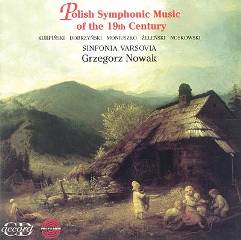Polish Symphonic Music of the 19th century (1994)
Polish Symphonic Music of the 19th century (1994)

1. Karol Kurpinski - Two Huts, Overture 2. Ignacy Feliks Dobrzynski – Monbar, Overture 3. Stanislaw Moniuszko - The Fairy Tale 4. Wladyslaw Zelenski - In the Tatra Mountains 5. Zygmunt Noskowski - The Steppes Sinfonia Varsovia Stanislaw Leszczynski – conductor
To chase the nay-sayers from the temple CD Accord has recorded this anthology of 19th century Polish symphonic music. If your taste runs to Rossini-Mendelssohn-Schumann with a nationalist 'dusting' then you must get this disc.
Kurpinski's Rossini-like overture with its silky lyrical premonitions of Weber has Beethovenian accents (Coriolan and Egmont). Dobrzynski's even more Weberian overture starts in shadows with very individual woodwind solos curling away in the bass until a warm yet tense theme enters at 1.34. A helter-skelter slaloming slide brings the festivities to a close. The overture by Moniuszko shows dramatic stage-craft coupled with the pathos of Mendelssohn (Fair Melusine, Calm Sea and Prosperous Voyage and Ruy Blas) and of Fuchs. Of all the Moniuszko overtures only Bajka (subtitled A Winter's Tale - so perhaps inspired by the Shakespeare play) is a free-standing concert work. Even then Moniuszko at 7.20 introduces a bel canto aria (minus voice of course) perhaps similar to one from his own operas such as Halka or Straszny Dwor (The Haunted Manor) - both recorded - or from Hrabina, Verbum Nobile or Paria). Zelenski, founder of the music conservatory in Cracow, although writing within the Schumann-Mendelssohn perimeter, introduced new elements. For example in his In the Tatras the writing for woodwind has a pastoral folksy thematic twist and there are Tchaikovskian moments (4.43) too. It is too early to pick out the Nietzschean or existentialist high hills sympathies of Novak, Delius, Szymanowski or Karlowicz but music's movement in that direction can be heard even if the packaging is strongly 19th century. Noskowski's three symphonies (1875, 1879, 1903) should be recorded. His tone poem The Steppe looks towards Russian models such as Borodin and Balakirev using the grand apparatus of the late romantic orchestra in subtlety of colour but coupled with a melodic invention that can best be compared with Arensky and Liapunov and, at 5.03, even Rachmaninov. The cleansing emptiness of the steppe is suggested but we also encounter the chivalric exploits of the wasteland's horse-rider nobility. As with the other pieces this is despatched with panache and imagination by a conductor I had not previously encountered on disc. The playing of the orchestra is well up to the best who the case of many of its players might well have been meeting these works for the first time.
Had this collection been issued by Hyperion, music-lovers outside Poland would have been snapping this up in hundreds. Don't let this collection slip past. ---Rob Barnett, musicweb-international.com
download: uploaded anonfiles yandex 4shared solidfiles mediafire mega filecloud








